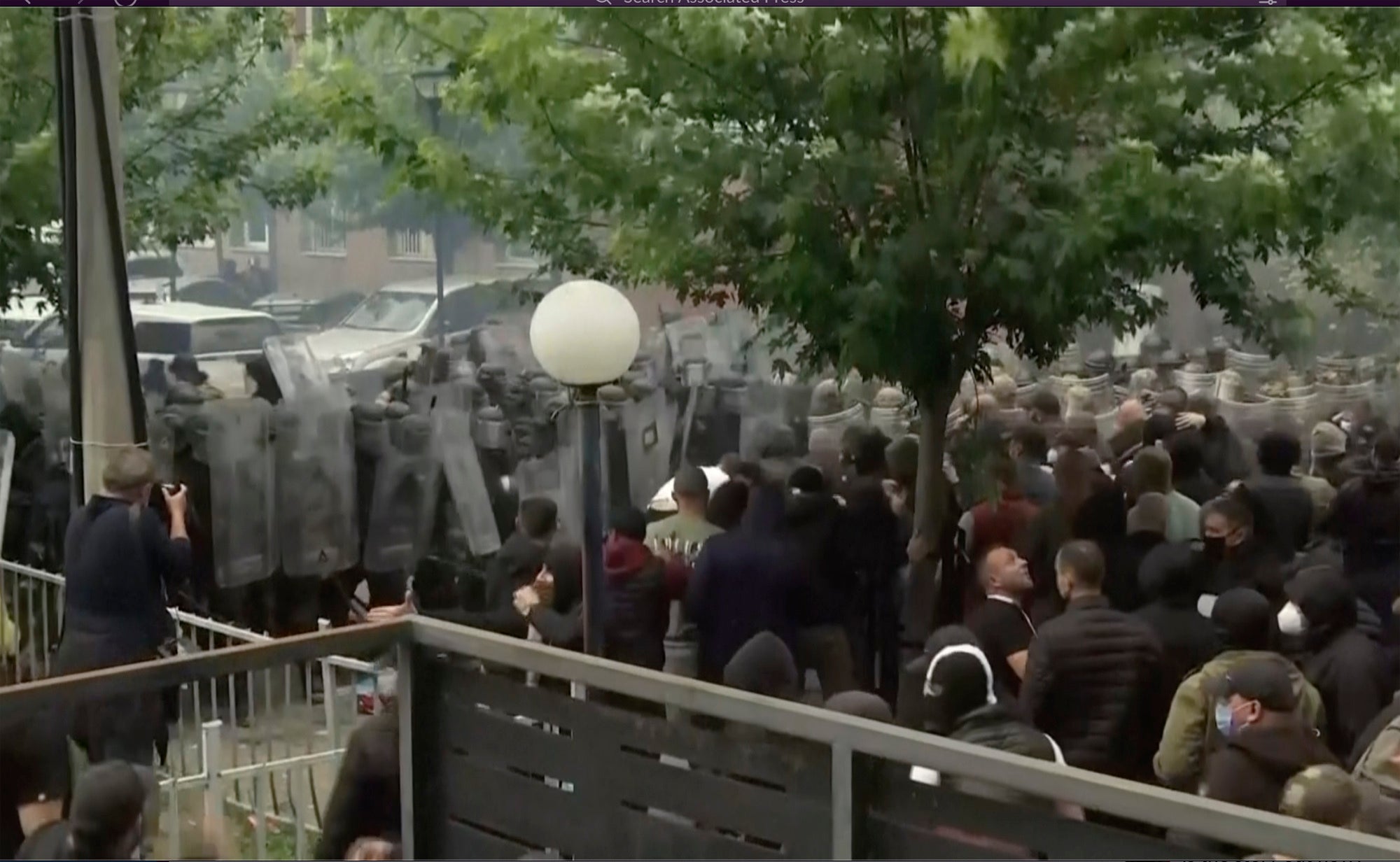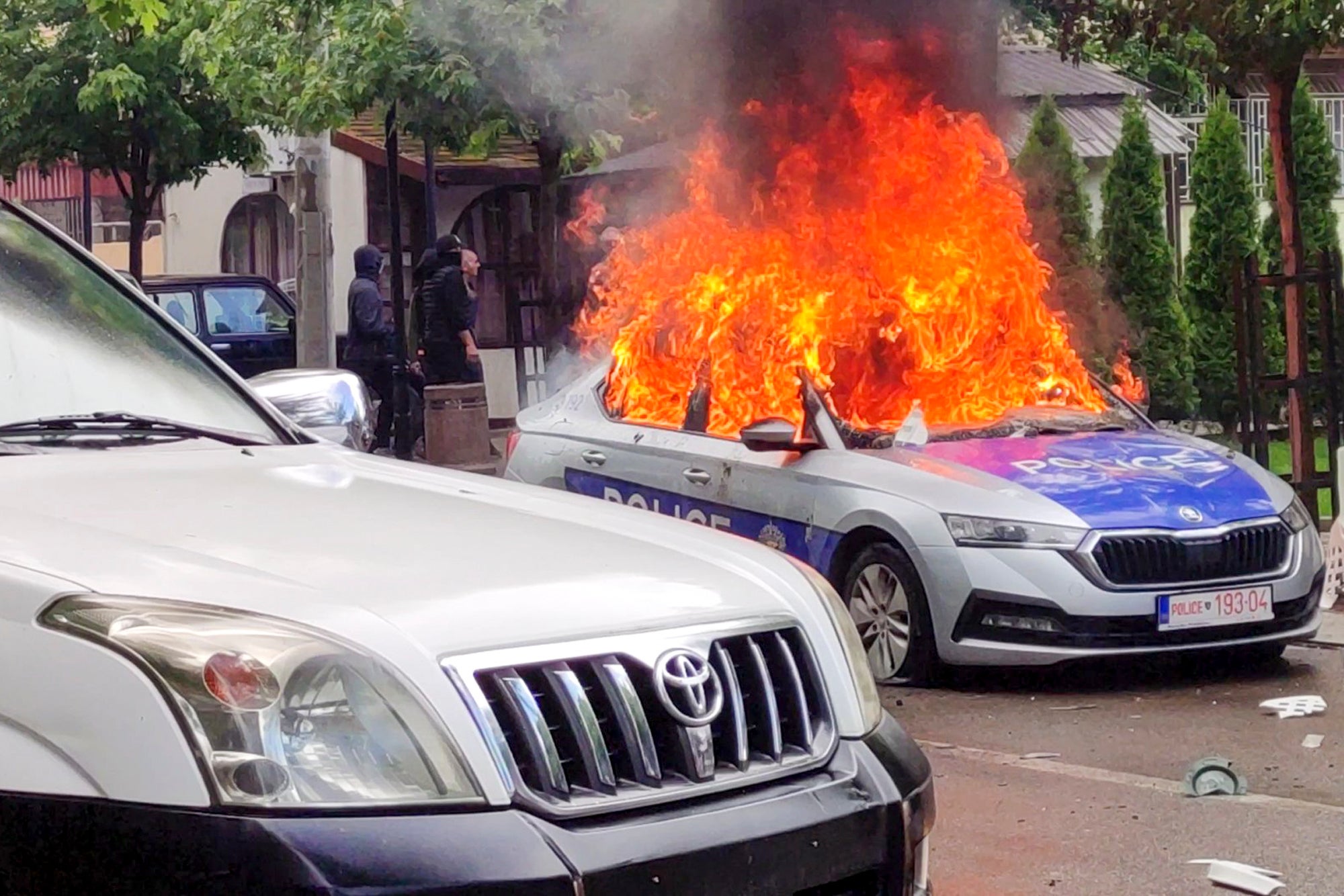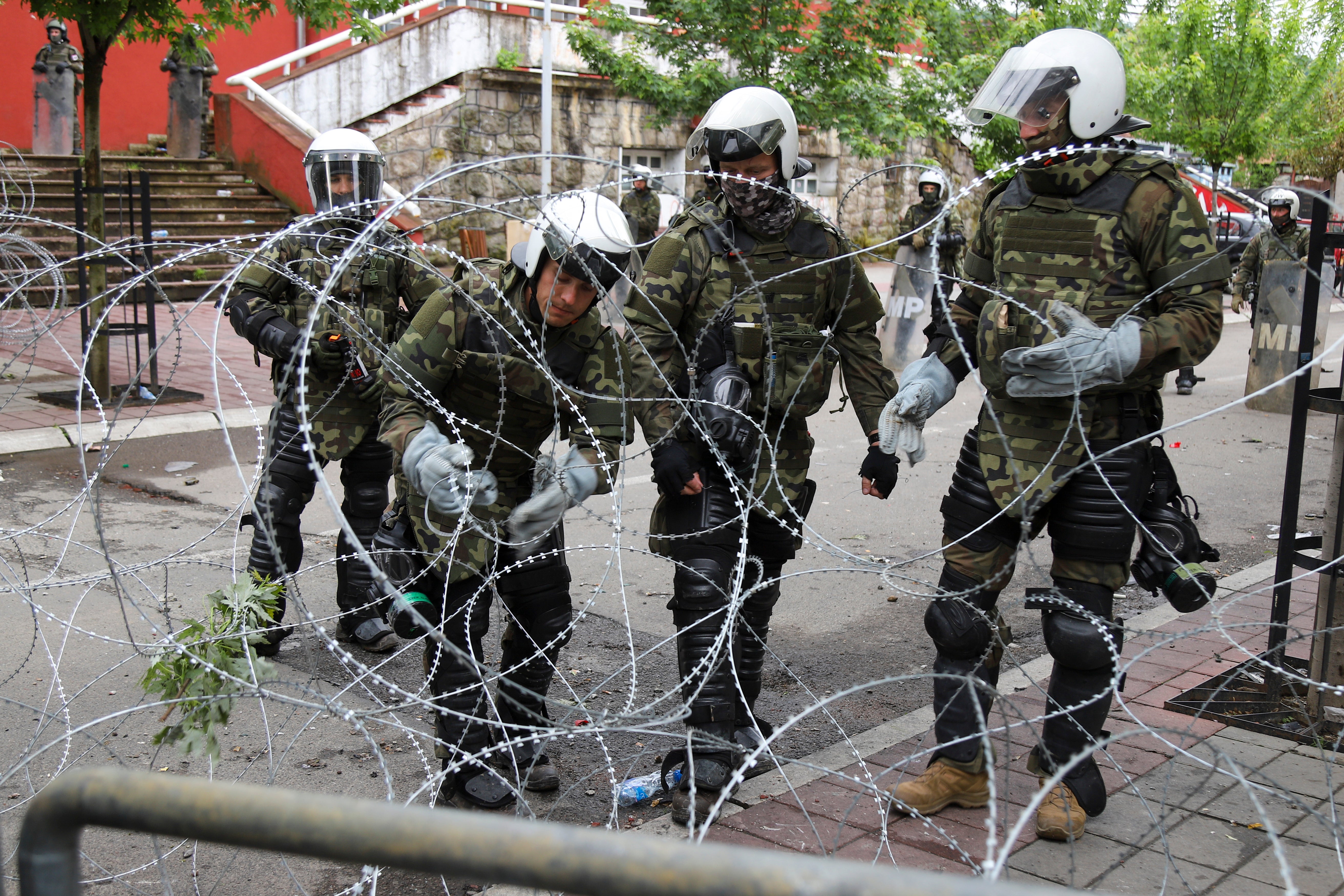The tension between Kosovo and Serbia has deep roots. The EU and US are still struggling to find a solution...
The violent clashes in northern Kosovo are the latest in a long line of flare-ups, writes Chris Stevenson


While Russia’s invasion of Ukraine was the issue that loomed largest over the summit of 47 European leaders in Moldova on Thursday, a significant undercurrent involved a crisis between Kosovo and Serbia around 500 miles away.
Tensions that have existed for decades burst into fresh violent clashes this week in northern Kosovo – and the political fallout shows few signs of abating quickly. The US, the EU and Russia are among those weighing in, while Nato has said it is ready to send more troops to the area if an end to the unrest is not forthcoming.
A complex historical dispute
Kosovo is a country in the Balkans that borders Albania, North Macedonia, Montenegro and Serbia. Of the 1.8 million people living there, 92 per cent are ethnic Albanians and 6 per cent are Serbian. The dispute over the identity of Kosovo stretches back centuries, with Serbia seeing it as the heart of its statehood and religion. The country is home to numerous medieval Serb Orthodox Christian monasteries, while Serbian nationalists view a 1389 battle there against Ottoman Turks as a symbol of their national struggle.
Decades of slowly building tension exploded as the Yugoslav federation fell apart in the 1990s under Serbian nationalist leader Slobodan Milosevic. In response, Kosovo’s ethnic Albanian leaders sought independence, and this would escalate into a rebellion and a brutal crackdown from Belgrade. The conflict, which ran from 1998 to 1999, claimed more than 10,000 lives and left more than a million people homeless. A Nato intervention in 1999 saw the Serbian forces pull out and cede control to international peacekeepers. Kosovo declared independence in 2008.

Ninety-nine of 193 UN nations now recognise Kosovo’s independence, including the US, the UK, and 22 of the 27 EU countries. However, Serbia has never accepted Kosovan statehood, and neither have its allies Russia and China. This deadlock has meant that tensions have continued to fester.
How an issue over car number plates sparked chaos
Around half of Kosovo’s Serbian population live in four districts in the north, where they constitute a significant majority. Attempts to issue items such as Kosovan IDs or car licence plates have been met with resistance over the years, and efforts at enforcement have led to protests and occasional violent clashes.
The car number plates became a significant issue near the end of last year, when Kosovan officials said that licence plates pre-dating the 1998-99 conflict could no longer be used. Fines of around £130 were due to be issued for the use of Serbian plates. The plans sparked the mass resignation of ethnic Serbs from all of Kosovo’s national institutions. This included police, with more than 600 ethnic Serb officers handing in their badges.
EU-mediated talks at the end of November failed to solve the dispute, but a US-requested 48-hour delay on the fines was agreed. As warnings of the threat of violence piled up, the EU foreign affairs chief, Josep Borrell, announced after a couple more days that a deal had been reached.
“Serbia will stop issuing licence plates with Kosovo cities’ denominations,” Borrell said, adding that “Kosovo will cease any further actions related to re-registration of vehicles.”
Borell expressed his frustration at the nationalist leaders of the two territories, Serbian president Aleksandar Vucic and Kosovo’s prime minister Albin Kurti, for failing to solve the dispute before that point. It would not be the last time.

The Serbian army then said in December that it was at its “highest level of combat readiness”, upping its presence on the Kosovan border after roadblocks appeared in the Serb-majority areas of northern Kosovo following the arrest of a former police officer – an ethnic Serb – on suspicion of attacking a Kosovan police officer. He was later released.
The Russia issue
In March this year, Borrell announced that Serbia and Kosovo had agreed – at least verbally – to an EU plan to normalise diplomatic ties. Both Kosovo and Serbia have sought to join the EU, giving EU officials leverage to apply pressure to bring both parties to the table. Serbia has been an EU candidate country since 2012, and Kosovo formally applied to join in December 2022 as Russia’s invasion of Ukraine dragged on.
Serbia has considerable influence in the western Balkans, and concern had grown among Western officials about the instability spreading, with Belgrade refusing to take part in European sanctions against Moscow.
“Finally,” said Borrell, speaking in the North Macedonian resort of Ohrid where the would-be detente between the countries had been thrashed out. “This is not just about Kosovo and Serbia,” he added. “This dialogue must be seen in the current broader geopolitical context, as an important tool to maintain peace and stability in the broader western Balkans region.”
An election problem
It was not to last. Serbs boycotted last month’s local elections held in northern Kosovo. Four ethnic Albanian mayors were elected on a turnout of less than 4 per cent. Last week, those would-be mayors were escorted to their offices by armed Kosovan police, provoking violent clashes with local Serbs that saw some Serbs as well as a number of peacekeeping troops injured.
Nato has sent 700 more troops to the area , adding to the 3,700-strong force that is stationed there, though Nato chief Jens Stoltenberg said on Thursday that more might be needed.
In a familiar pattern, both Kosovo’s prime minister, Kurti, and Serbia’s president, Vucic, have refused to back down, despite saying they want the situation resolved. The EU and the US have called for tensions to be reduced, and Washington said that attempts to force the mayors to take office was an “unnecessary” escalation. It also cancelled Kosovo’s participation in a US-led military exercise. The Kremlin weighed in to say that the rights of Serbians must be respected, while Serbian tennis star Novak Djokovic signed a camera lens with the slogan: “Kosovo is the heart of Serbia. Stop the violence” – an act that will not have helped matters.
At the summit in Moldova on Thursday, Vucic said the quickest way to peace would be for the Kosovan authorities to withdraw the “alleged mayors” from the north and declare that the Kosovan special police units were there illegally. Kosovo’s president, Vjosa Osmani, who attended in place of Kurti, said that Serbia was backing “criminal gangs” in northern Kosovo.
The pair held discussions with the leaders of France and Germany – as well as with the EU’s Borrell – in an effort to deal with the crisis. French president Emmanuel Macron said that he and Germany’s chancellor, Olaf Scholz, had urged that new elections be held as soon as possible, and that the rules around them should be clarified.
History suggests that getting both sides to agree and take action may not be so simple.






Join our commenting forum
Join thought-provoking conversations, follow other Independent readers and see their replies
Comments